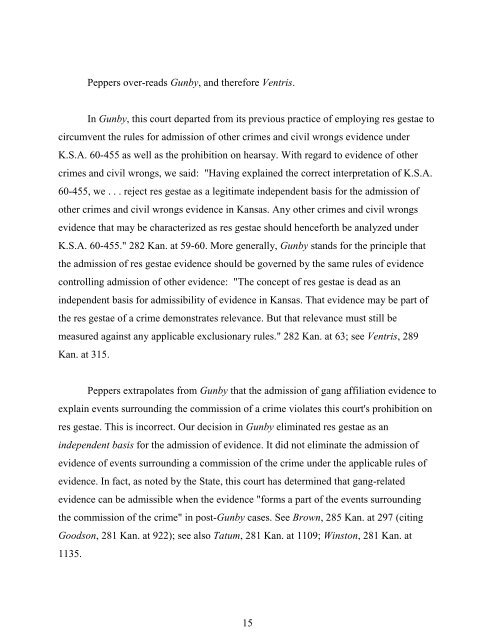Kansas Supreme Court - 101551 â State v. Peppers
Kansas Supreme Court - 101551 â State v. Peppers
Kansas Supreme Court - 101551 â State v. Peppers
You also want an ePaper? Increase the reach of your titles
YUMPU automatically turns print PDFs into web optimized ePapers that Google loves.
<strong>Peppers</strong> over-reads Gunby, and therefore Ventris.<br />
In Gunby, this court departed from its previous practice of employing res gestae to<br />
circumvent the rules for admission of other crimes and civil wrongs evidence under<br />
K.S.A. 60-455 as well as the prohibition on hearsay. With regard to evidence of other<br />
crimes and civil wrongs, we said: "Having explained the correct interpretation of K.S.A.<br />
60-455, we . . . reject res gestae as a legitimate independent basis for the admission of<br />
other crimes and civil wrongs evidence in <strong>Kansas</strong>. Any other crimes and civil wrongs<br />
evidence that may be characterized as res gestae should henceforth be analyzed under<br />
K.S.A. 60-455." 282 Kan. at 59-60. More generally, Gunby stands for the principle that<br />
the admission of res gestae evidence should be governed by the same rules of evidence<br />
controlling admission of other evidence: "The concept of res gestae is dead as an<br />
independent basis for admissibility of evidence in <strong>Kansas</strong>. That evidence may be part of<br />
the res gestae of a crime demonstrates relevance. But that relevance must still be<br />
measured against any applicable exclusionary rules." 282 Kan. at 63; see Ventris, 289<br />
Kan. at 315.<br />
<strong>Peppers</strong> extrapolates from Gunby that the admission of gang affiliation evidence to<br />
explain events surrounding the commission of a crime violates this court's prohibition on<br />
res gestae. This is incorrect. Our decision in Gunby eliminated res gestae as an<br />
independent basis for the admission of evidence. It did not eliminate the admission of<br />
evidence of events surrounding a commission of the crime under the applicable rules of<br />
evidence. In fact, as noted by the <strong>State</strong>, this court has determined that gang-related<br />
evidence can be admissible when the evidence "forms a part of the events surrounding<br />
the commission of the crime" in post-Gunby cases. See Brown, 285 Kan. at 297 (citing<br />
Goodson, 281 Kan. at 922); see also Tatum, 281 Kan. at 1109; Winston, 281 Kan. at<br />
1135.<br />
15
















